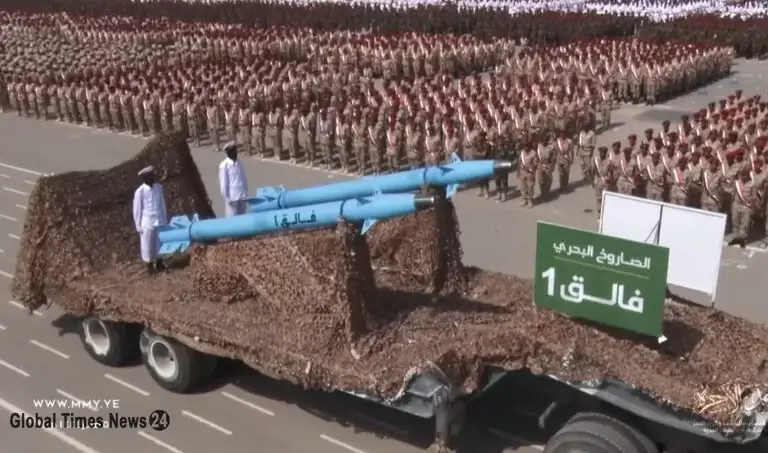The ceasefire in Yemen that lasted for six months has ended and Sana'a has announced that it will not be extended due to the violations carried out by the other side.
The ceasefire brokered by the United Nations, initially took effect on April 2 and was extended twice, despite both sides trading accusations of violating the truce.
Meanwhile, the Yemen's Armed Forces' spokesman Yahya Saree warned the oil firms to organize and leave Saudi Arabia and the UAE as soon as possible.
"If the Saudi and Emirati coalition continue to deprive our Yemeni people access to their resources, our military forces can, with God's help, deprive them of their resources," Yahya Saree said on twitter.
Sana'a hopes that the remaining opportunity will be used to prevent a return to war, because if the flames of war flare up, it will be difficult to stop it, a war in which the upper hand will undoubtedly be of the Yemeni side, which due to its new military capabilities can hit at any point, port or ship in the Red Sea, including the Saudi oil facilities, and at the top of them, the Aramco oil company, also the ports and oil facilities of the UAE, will be in the crosshairs of its new ballistic missiles and sea-based cruise missiles.
The Houthis have mustered tens of thousands of troops and powerful weapons that are dominating the region, on land and sea.
The naval capabilities were shown in the recent parades highlighting fast attack boats, electronic attack boats, sea mines, and remotely controlled “suicide boats.”
Also, the new ballistic, cruise and loitering missiles displayed by the Houthis in the recent military parades, have the power to reach anywhere in the Red Sea, which is a warning message to all sides in the conflict.
![]()
With these new weapons, Houthis pose an exponentially growing threat to maritime traffic in the Gulf of Aden and the Red Sea, far beyond the choke point of Bab-El Mandeb straits they already dominate.
Houthis have gradually extended the range of their weapons from tens to a few hundred nautical miles. Rather than employing these weapons on board ships to extend range, they can now reach beyond 200 nm, using the new ballistic anti-ship missiles, practically blocking the movements of naval vessels well beyond Yemen’s coastal waters.
In the meantime, Eilat airport and all commercial ships of Israel seem to be in the targets of the Yemeni army and the Houthis.
According a recent reportof the think tank "Washington Institute for Near East Policy", the Houthis’ demonstrated capacity to reach Abu Dhabi with UAVs has created regional concerns about the Houthis’ growing power.
Considering the changes and developments that are happening at the international and regional level, it seems that only negotiations from both sides can have a great effect on calming the region and preventing a full-scale war.
In March 2015, a Saudi Arabia-led coalition, including the United Arab Emirates, began a military campaign that has resulted in an impasse and has devastated the country, creating what the UN has described as the world’s worst humanitarian crisis.
The United States, supported the Saudi-led military intervention with direct military support and offensive arms sales to Saudi Arabia.
A U.N. Development Programme report found that of the estimated 377,000 deaths caused by the conflict as of the end of 2021, nearly 60 percent were caused by lack of access to food, water, or health care.
Today, 2 out of 3 people in a country of 31 million rely on humanitarian assistance to meet their daily needs. Soaring food prices are also pushing Yemenis closer to starvation, while preventable diseases, such as cholera, dengue, malaria, and diphtheria, are spreading rapidly.
News ID : 1320
 Iraqi Resistance Conducts Drone Attack on Military Target in Northern Occupied Territories
World / Breaking News
Iraqi Resistance Conducts Drone Attack on Military Target in Northern Occupied Territories
World / Breaking News
 Tensions Mount: Israel's Iron Barriers at Al-Aqsa Mosque Draw Condemnation
World / Breaking News
Tensions Mount: Israel's Iron Barriers at Al-Aqsa Mosque Draw Condemnation
World / Breaking News
 Israel's Fragility Heightens on the Eve of Quds Day
World / Opinion / Breaking News
Israel's Fragility Heightens on the Eve of Quds Day
World / Opinion / Breaking News
 China summons Japanese envoy over G7 communique
World / Breaking News
China summons Japanese envoy over G7 communique
World / Breaking News
 Biden Reframes Netanyahu as "Evil Man"
World / Breaking News
Biden Reframes Netanyahu as "Evil Man"
World / Breaking News
 Despite Biden's vows, Yemen starves
Human Rights
Despite Biden's vows, Yemen starves
Human Rights
 Yahya Saree: We have prepared special weapons to combat the enemy
World
Yahya Saree: We have prepared special weapons to combat the enemy
World
 Demonstration of Houthis military power with anti-ship missiles
World / Breaking News / Opinion
Demonstration of Houthis military power with anti-ship missiles
World / Breaking News / Opinion
 Increase in the cost of Hajj up to 300% in 2022
World / Top News / Breaking News
Increase in the cost of Hajj up to 300% in 2022
World / Top News / Breaking News
 Yemeni military statement on missile and drone strikes deep in Saudi Arabia
World
Yemeni military statement on missile and drone strikes deep in Saudi Arabia
World